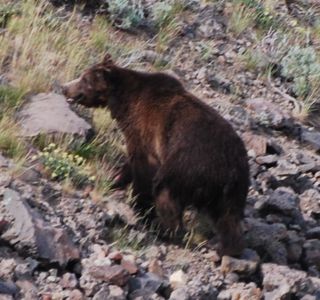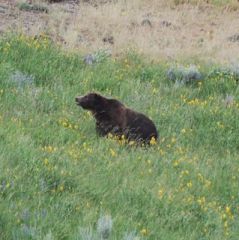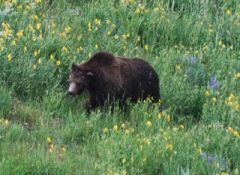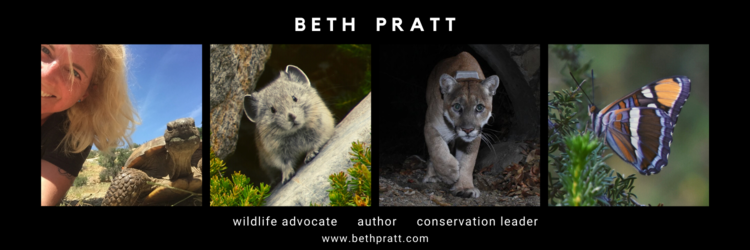 Enos Mills, often referred to as the John Muir of the Rocky Mountains, described grizzly bears as “our greatest wild animal” and “dignified and so-strangely human-like.”
Enos Mills, often referred to as the John Muir of the Rocky Mountains, described grizzly bears as “our greatest wild animal” and “dignified and so-strangely human-like.”
For me, when I observe a grizzly in the wild, words like magnificent and mesmerizing come to mind. Truly, the sight of a grizzly bear, a kingly animal who has evolved to the top of the food chain, is a testament to nature’s wisdom and attention to the beauty of her creations.
Watching this large grizzly bear in a meadow on Dunraven Pass captivated me—in the presence of greatness, I can do little more than stare in awe (and also make sure I remain a safe distance away!).
Mary Oliver, one of my favorite poets, captures the emotion of seeing (or almost seeing) a bear perfectly in her poem, “Bear.”
Bear by Mary Oliver
 It’s not my track,
It’s not my track,
I say, seeing
the ball of the foot and the wide heel
and the naily, untrimmed
toes. And I say again,
for emphasis,
to no one but myself, since no one is
with me. This is
not my track, and this is an extremely
large foot, I wonder
how large a body must be to make
such a track, I am beginning to make
bad jokes. I have read probably
a hundred narratives where someone saw
just what I am seeing. Various things
happened next. A fairly long list, I won’t 
go into it. But not one of them told
what happened next–I mean, before whatever happens–
how the distances light up, how the clouds
are the most lovely shapes you have ever seen, how
the wild flowers at your feet begin distilling a fragrance
different, and sweeter than any you ever stood upon before–how
every leaf on the whole mountain is aflutter.
